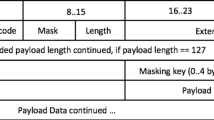Abstract
In this paper we describe how progressive download and adaptive streaming can be combined into a simple and efficient streaming framework. Based on the MPEG-4 file format (MP4) we use HTTP for transport and argue that these two components are sufficient for specifying an open streaming architecture. The client selects appropriate chunks from the MP4 file to be transferred based on (1) the header information (i.e. the “moov” box) in the first part of the file and (2) his observation of network throughput. The framework is completely client driven which allows for better server scalability and reduces signalling overhead. We discuss architecture and implementation issues such as complexity, interoperability and scalability and compare to 3GPP PSS Rel-6 adaptive streaming when appropriate. Measurements from a simple MP4/HTTP streaming client are presented showing that appropriate chunks are selected such that increased reliability is achieved.
Similar content being viewed by others
References
Chou, P.A., Sehgal, A., 2000. Rate-Distortion Optimized Receiver-Driven Streaming over Best-Effort Networks. Packet Video Workshop. Pittsburg, PA.
Chou, P.A., Miao, Z., 2001. Rate-Distortion Optimized Streaming of Packetized Media. Microsoft Research Technical Report MSR-TR-2001-35.
Fielding, R., Gettys, J., Mogul, J., et al., 1999. IETF RFC 2616: Hypertext Transfer Protocol-HTTP/1.1.
Girod, B., Kalman, M., Liang, Y., Zhang, R., 2002. Advances in Channel-adaptive Video Streaming. Proc. IEEE International Conference on Image Processing ICIP. Rochester, NY, 1:9–12.
Handley, M., Jacobson, V., 1998. IETF RFC 2327: SDP: Session Description Protocol.
ISO/IEC 14496-10, 2003. Information technology—Coding of Audio-Visual Objects—Part 10: Advanced Video Coding.
ISO/IEC 14496-14, 2003. Information Technology—Coding of Audio-Visual Objects—Part 14: MP4 file format.
ITU-T Recommendation H.264, 2003. Advanced Video Coding for Generic Audiovisual Services.
Ott, J., Wenger, S., Sato, N., et al., 2004. IETF Internet Draft: Extended RTP Profile for RTCP-based Feedback (RTP/AVPF). Http://www.ietf.org/internet-drafts/draftietf-avt-rtcp-feedback-11.txt.
ReaNetworks, 2004. RealNetworks Production Guide. p.49–51.
Schulzrinne, H., Rao, A., Lanphier, R., 1998. IETF RFC 2326: Real Time Streaming Protocol (RTSP).
Schulzrinne, H., Casner, S., Frederick, R., 1998. IETF RFC 2326: Real Time Streaming Protocol (RTSP).
Schulzrinne, H., Casner, S., Frederick, R., Jacobson, V., 2003. IETF RFC 3550: RTP: A Transport Protocol for Real-Time Applications.
Wang, B., Kurose, J., Shenoy, P., Towsley, D., 2004. Multimedia Streaming via TCP: An Analytic Performance Study. Proceedings of ACM Multimedia (Multimedia 2004). New York.
Wenger, S., Hannuksela, M.M., Stockhammer, T., et al., 2005: IETF RFC 3984: RTP Payload Format for H.264 Video.
Author information
Authors and Affiliations
Corresponding author
Rights and permissions
About this article
Cite this article
Färber, N., Döhla, S. & Issing, J. Adaptive progressive download based on the MPEG-4 file format. J. Zhejiang Univ. - Sci. A 7 (Suppl 1), 106–111 (2006). https://doi.org/10.1631/jzus.2006.AS0106
Received:
Accepted:
Published:
Issue Date:
DOI: https://doi.org/10.1631/jzus.2006.AS0106




